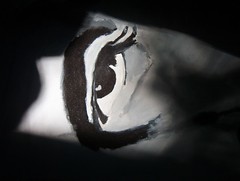ok
The time has finally come for me to ramble aimlessly about the changing of the season. Instead of that however I think I will just leave a big blank space on that subject since in any case I lack the taste for rambling. A couple of Sunday afternoons ago I spent some hours at the local reservoir, taking in some of the sand and sun there. Now it is getting cooler; I've been able to wear a sweater now. Happiness to me is sitting in a chair wearing a good sweater and drinking green tea while leaves fall outside.
I haven't been very reflective for the past couple of months--not verbally anyway. Because every single time words are put down, you want to revise them. At least that's the case for me. Not to mention the fear of sounding pretentious. Fortunately i've gotten as far as realizing that those who fear pretentiousness and so avoid saying anything high-sounding (e.g. any sort of philosophizing) are actually being pretentious themselves. So in the end I want to say what I feel like saying. Now i need to put this into practice with a good measure of moderation.
Those of you who are always sure about your words will of course pooh pooh this sentiment of mine. Perhaps this is because it is assumed that this sentiment comes from aprehension about what people will think about what I will say (which is foolish). I want to say that it is not, but I cannot say what it is. I could say what I think it is, but you will not believe me. I don't have the stomach for it. You will not believe me. There will be all sorts of psychological reasonings that even now resonate in my mind, even in parallel with the philosophical ones.
Everyone has his or her own personal reasons and pseudo reasons about why someone did this or that or the other thing instead of doing what he/she thinks is the right way to do things. It's just like the cycle of violence. Dialogue can be just like violence.
I won't state this solidly. Because it is only part of the truth. Everything is a perspective. I say this because I feel it now, not because I set it up against truth like one holds a color swatch up to an item to tell if the item is a certain color but because of a feeling. This example provides not only my juxtaposition of two ways of judging something but also an example, though not a good one, of what I am now putting into words. The color swatch example is a feeling also (which of course has both a psychological [conditioning] and physiological [brain patterns, etc.] explanation, but this does not disount its content as a feeling, since both of the explanations are feelings as well even though they could be described as being a more 'granular' explanation).
This demonstrates a point I am now feeling out, like feeling out a dark room--only having just come from another room that I felt out to see what it was like then found a door leading me into more confusing shapes and categories of thinking etc.
What point does this demonstrate? Even if you think you have some item to point at, some criterion, some element of your experience, some proof text or other miscellaneous phenomena, or some formula which says this is true it is also possible to look at it in the way of a feeling: just like the color swatch example uses both feeling (my sense perception which makes the test usable) and formula (which is the test itself--i.e. the 'formula' [of sorts] of taking a color swatch and comparing it to an item [this is a formula because it is a general prescription for action that proposes to give a desired result: answer the question is this item that color?]).
Now I must apologize, but I have to slip into a different mode of speaking that many seem to find offensive. I am, at this point in time, a supporter of this mode of speech because making things clear (or at least feeling like I am able to grasp them solidly if only for a few moments) is an itch that I must scratch. We all have our itches, let me scratch mine. Please. Note that I do not actually claim that I am making things clear because that is not something it is possible for me to really do per se. Rather, clarity is something which comes between two people (or perhaps entities) when they somehow mesh or come into synch with each other and is not possible only for one person (entity).
Okay. Now. What i am trying to feel out has the following resemblance.
You set up a definition of truth, say,
(DT) We say 'p is true' if and only if (1) p is a complete sentence and (2) the concrete relationships attributed to any concrete objects in p hold in reality.
Technically this isn't circular (because DT is a meta-statement about a language which just so happens to resemble English). But practically it is impotent--which to my ears is to say that it doesn't help you solve much.
Anyway lets leave the merits of the definition alone, because that's not the point. The point is that we have some, any, definition of some thing--it doesn't have to be truth--it could be the Good, or whatever your favorite topic might be, Galois groups for all I care.
But let us use DT as our example. It has two parts: (1) the concept defined and (2) the terms which define the concept to be defined. There are some technical words for these two things but I can never remember them and it isn't important.
The point of the definition is to help us pick out the concept defined. For example if there is an argument about whether something is true we are, it is supposed, to refer to the definition to resolve the dispute. Just like a fucking dictionary.
In DT we want to be able to resolve disputes about when to say 'p is true'. So we set out some definition and refer to it thinking we have solved the problem. But yet another arises. When do we say that the definition has been satisfied? How do we use the definition? How do we evaluate whether the right side of the definition is satisfied (i.e. true)? This involves evaluating the truth of another statement. Which we will, presumably, do by refering to our definition of truth once more. But then again we must evaluate, evaluate, and so on. So...where does this stop? It doesn't unless we make it stop by a direct evaluation. I'm not sure what else to call this other than a feeling. It's like this. We can rewrite our definition:
(DT2) T(p) if and only if T(a) and T(b).
Where T(p) means that p is true, etc. So that if we want to evaluate whether T(p) we must evaluate T(a) and T(b) and to do that we must evaluate T(a1) and T(a2) as well as T(b1) and T(b2), etc.
O.K. This is boring. That's all a very hackneyed foundationalist look at the world. Of course it is. But the point is that it doesn't matter whether we think we are foundationalist or not, but if you believe that there is truth of any kind then you must believe in a certain phenomenon which indicates its presence. Even if you don't believe in any particular classical notion of truth there is a criterion you believe in. Even if it's just 'This is what I'm doing' and you pride yourself as some open-minded enligtened person.
I don't feel, as I used to, that this says that truth doesn't exist, but it leads me to an even more awkward conclusion. In the end our feelings are what define what we say is true or false. Even if we set up a definition of truth, and believe that truth is absolutely this--even then the application of that criterion is an experience. A feeling. You can't break out of the experience.
This is awkward because feelings are pretty shaky. I don't mean this in the traditional sense of saying that feelings lack veracity. I'm just saying that feelings don't contain their own witness, nor do they stick around forever.
Keep in mind I'm not disparaging feelings here. Just voicing my apprehension about them. I'm sure other people have different opinions about their own feelings. Perhaps for them their feelings are not so shaky as I am making them out to be. However, I can attest to my feelings about my feelings and they attest that they are not reliable. So even if someone elses feelings are reliable, merely because I feel that mine are unreliable, it is valid to say that feelings in general are unreliable because if that were not the case then everyone's feelings would have to be reliable and since I am part of everyone I have proven by contradiction that that is false.
Or some such nonsense. Because proof by contradiction is just a feeling. Or so I feel.
These feelings come mostly from my being pissed off at the authors of the texts I read for one of my independent studies last Fall. Epistemology. It really pissed me off when the author wrote a paragraph or two about skepticism and then just dismissed it with an arrogant remark like, well, no rational person believes in that shit. But, admittedly, the complete skeptic (which, I think, doesn't exist--I mean no real person is such a person since everybody has to live) is a bunch of crap too.
Please relate this back to the color swatch example. We apply the formula of putting up a swatch to see which of two colors it is the best to attribute to some item, e.g. a set of curtains you are arguing about with someone whether they are lavender or purple. (I realize of course that we don't actually use color swatches in such a situation, but probably you might refer to some commonly known object--e.g. a flower called lavender.) The practice of using the color swatch is also an experience. Using the color swatch doesn't suspend experience and bring us outside to some realm of direct awareness.
Now, there is a way in which there is yet another 'room' to be felt out in all of this. Namely, there is a way of fencing our experiences in so that the situation again tends toward being formulaic. But I suspect that it goes back again to feeling, because the fences themselves are elements of experience.
Okay so what all this means to me is that my sentiment about my words (as mentioned above) comes because in the back of my mind I always know that I might be wrong, but so might you be, because there is always a remaining factor which isn't fenced in.




